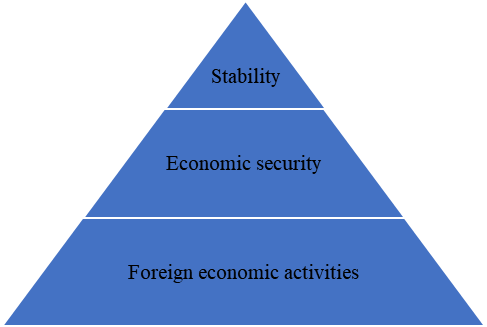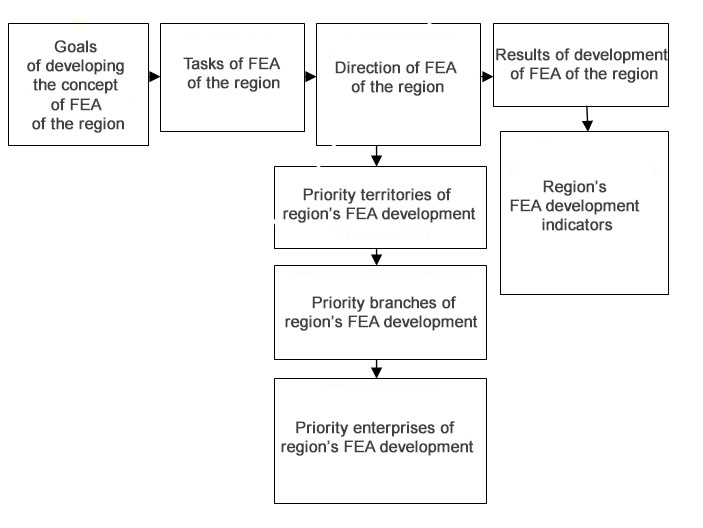Abstract
Under the financial globalization and internationalization of the economy, each Russian region should develop foreign economic relations to improve its competitiveness. The expansion of international relations between various economic agents increases the number of counterparties and creates dangers that threaten the regional and national economic security. Agricultural producers should be especially careful considering the specifics of their production. A competent approach to the concept of foreign economic activities of the regions based on the analysis of statistical information and factors influencing the stability of the regional economy can strengthen the financial condition of the regions and minimize risks associated with foreign trade and threats to economic security and stability of the region. The relevance of the research issue is justified by the fact that certain risks are inherent in foreign economic activities. The risks characteristic of foreign economic activities of the regions include location risks and external risks (political, macroeconomic, legal, etc.) Each of these risks has a direct impact on the stability of the region and its economic security, disrupting the equilibrium development of the region. It is important to take into account peculiarities of development (historical, cultural, economic, natural-climatic, etc.) when planning foreign economic activities in the region. The present article studies the relationship of foreign economic activities, economic security and stability of the region, conditions for the expansion of foreign economic activities. The author's approach to the development of the concept of foreign economic activities of the Russian regions is presented.
Keywords: Agricultural, foreign economic activity, region, sustainability
Introduction
Numerous economic studies unequivocally indicate that the national security is determined by the economic stability. At the same time, the topical issue is country's competitiveness. If we consider this problem within the boundaries of a specific national economy, the competitiveness of Russia in foreign markets, its economic security, depend on the economy of its territorial units, i.e., the regions of the Russian Federation. At the same time, it is difficult to establish international relations for those regions of Russia that historically belong to the agricultural sector of the economy (Artamonova & Baturina, 2020a; Stasev, 2012).
Problem Statement
Currently, foreign economic relations are developing at the federal and regional levels. It is interesting to ensure the sustainability of development of the regional economy in terms of foreign economic activities (Golovina, 2010). The stable economic development of the regions, their foreign economic activities contribute to the improvement of technological processes, implementation of innovations, and expansion of interstate relations. At the same time, the significant openness of the economy can enhance the dependence of the regional economy on imports and threaten its sustainability (Stepnov & Suvorova, 2012).
Research Questions
The research subject is several economic concepts and phenomena: stability of the region, economic security, and foreign economic activity. They can be viewed from several points of view: economic phenomena, terminology of economic science, regional environment (external or internal), security indicators, etc. In most cases, these categories are defined as
foreign economic activity of a region is a set of foreign trade, industrial, investment, monetary and financial, scientific and technical and other economic relations of the regions of the Russian Federation with foreign countries and their administrative territorial units (regions, lands, states, etc.);
regional stability is a process leading to the solution of the main problems of the population at the level of the region of the Russian Federation by ensuring the balanced development of the economy, ecology, social sphere, etc., based on the use of available resources (actually available and potential);
economic security of the region is a set of conditions and factors that characterize the current state of its economy, stability, sustainability and development (Artamonova & Baturina, 2020b; Stasev, 2012).
Purpose of the Study
The purpose of this article is to determine the relationship and mutual influence of the main categories involved in foreign economic activities of the Russian regions. First of all, it is important to study the interdependence between foreign economic activities (export operations will be a priority), stability and economic security of the regional economy.
Research Methods
Articles on similar and related topics, the legislation of the Russian Federation and the EAEU on foreign economic activities were studied. The most interesting sources are included in the list of literature in compliance with the citation rules. The information was systematized, analyzed and presented in the form of abstracts and figures.
Findings
The relationship between foreign economic activity, economic security and stability of the region can be represented as follows (Figure 1).

The pyramid allows us to conclude that properly organized foreign trade and foreign economic relations will allow the regions of the Russian Federation to gain additional income, provide the population with jobs (accordingly, social tension will decrease), which can strengthen the economic security and sustainable development of the region. The interrelation of these processes (phenomena) led to the emergence of a new concept - external economic security. Foreign economic security is
implementation of regional economic processes, which will create the required conditions and resources for economic stability and development of the region of the Russian Federation, preservation of integrity of the system, successful opposition to possible threats to economic security in foreign economic activities (Stasev, 2012, p. 163).
Proceeding from the fact that customs and foreign economic activities are regulated by federal laws, the regions should pay attention to the development of the concept of foreign economic activities. This document is a local regulatory legal act, which includes goals, objectives, directions, priority development areas, results and indicators characterizing effects achieved when implementing the regional foreign economic strategy (Figure 2).

Stepnov and Suvorova (2012) identified a number of fundamental conditions for organizing foreign economic activities at the subfederal level:
- state protection of the rights and interests of participants in foreign economic activities;
- their equality and non-discrimination;
- the unity of the customs territory;
- reciprocity in relation to other regions, countries, etc.
The generalization of regional trade conditions is in line with the main provisions of the customs policy of the EAEU and Russia. In order to prevent the negative impact of the expansion of foreign economic relations arising from an increase in imports, as well as the strong orientation of domestic producers for export, one should adhere to a certain sequence in the development and implementation of the concept of regional foreign economic activities:
1) constant monitoring of external and internal factors that determine the competitiveness of a region of the Russian Federation, both in the internal and external markets. For this purpose, the SWOT analysis mechanism can be used;
2) collection, generalization, grouping and analysis of initial data (dynamics of production of main products, production index, development of economic sectors, budget, foreign trade, imports and exports, etc.);
3) assessment of the current state of regional foreign economic activities;
4) determination of specialization and competitive advantages of the region;
5) substantiation of priorities and directions of development of foreign economic activities of the region;
6) development of promising directions for the development of foreign economic activities of the region;
7) formulation of the main provisions of the concept of regional foreign economic activities, its registration (Seredin, 2014).
When developing the concept taking into account the agrarian specialization of the region, it is necessary to study information about possible foreign markets, as well as the degree of dependence of the region of the Russian Federation on imports.
Conclusion
Thus, it is necessary to study the potential and possibilities of the regional economy and foreign economic activities. In addition, due to the large territory of Russia and differentiation in the development of its regions, when developing the concept of regional foreign economic activities, it is necessary to take into account such criteria as:
- the level of economic development;
- cultural, national, historical features of the territory;
- sectoral specialization of the regional economy;
- natural and climatic conditions (Dalchenko & Plohotnikova, 2019; Seredin, 2014).
When developing a strategy for the development of foreign economic activities of the country, it is necessary to reorganize them in the regions, considering each of them as an independent object of regulation. Thus, a high level of specialization and uneven development of the regions can become a strong brake on economic growth, which will negatively affect the stability of the regional economy.
Foreign economic activities can and should be used as a way to improve the socio-economic development of agricultural regions and, accordingly, as a factor in increasing the sustainability of the economy (investment attractiveness will improve, budget revenues will increase, the population will be provided with jobs, etc.). In other words, the development of foreign economic activities at the sub-federal level will increase the standards of living of the population in rural areas and the volume of agricultural production. This will have a positive effect on the economic security of regions and the country as a whole.
References
Artamonova, I. A., & Baturina, I. N. (2020a). Ensuring the economic security of an economic entity in the implementation of foreign trade International Conference on Global Trends in Academic Research: Conference Proceedings (pp. 106-111). Los Gatos, SPO “Professional science”, Lulu Inc.
Artamonova, I. A., & Baturina, I. N. (2020b). The relationship between the stability of the region and its economic security. All-Russian (national) scientific-practical conference with international participation: Priority areas of regional development (pp. 15-19). Kurgan State Agricultural Academy named after T.S. Maltseva (Lesnikovo).
Dalchenko, E. A., & Plohotnikova, G. V. (2019). Directions for increasing the efficiency of foreign economic activity at the mesoeconomic level (based on materials from the Rostov region). Regional problems of economic transformation, 2(100), 81-86.
Golovina, P. P. (2010). Features of the development of regional foreign economic activity towards the formation of the international competitiveness of the region. Terra Economicus, 8(3-2), 205-212.
Seredin, M. I. (2014). Foreign economic activity as a tool for the development of the region. Bulletin of the Adyghe State University. Series 5: Economics, 4(151), 108-112.
Stasev, M. A. (2012). The role of security in the system of foreign economic activity to improve national economic security. Terra Economicus, 10(4-2), 163-166.
Stepnov, I. M., & Suvorova, M. E. (2012). Regulation of foreign economic activity as a factor in increasing the competitiveness of the region (on the example of the Ryazan region). Russian Foreign Economic Bulletin, 11, 34-42.
Copyright information

This work is licensed under a Creative Commons Attribution-NonCommercial-NoDerivatives 4.0 International License.
About this article
Publication Date
01 July 2021
Article Doi
eBook ISBN
978-1-80296-112-6
Publisher
European Publisher
Volume
113
Print ISBN (optional)
-
Edition Number
1st Edition
Pages
1-944
Subjects
Land economy, land planning, rural development, resource management, real estates, agricultural policies
Cite this article as:
Artamonova, I. A., Baturina, I. N., Borovinskih, V. A., & Chepelyuk, N. Y. (2021). Foreign Economic Activity And Stability Of The Economy Of The Agricultural Region. In D. S. Nardin, O. V. Stepanova, & V. V. Kuznetsova (Eds.), Land Economy and Rural Studies Essentials, vol 113. European Proceedings of Social and Behavioural Sciences (pp. 19-24). European Publisher. https://doi.org/10.15405/epsbs.2021.07.3

